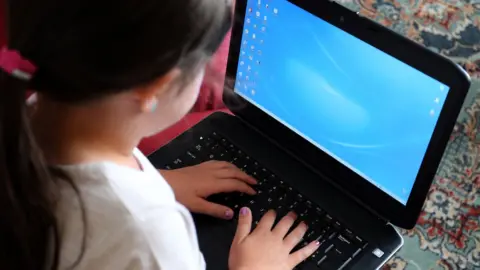Coronavirus: Half of pupils not engaging remotely
 PA Media
PA MediaAbout half of pupils in some post-primary year groups did not take part in remote learning after schools closed in March.
Some primary schools, meanwhile, said parents wanted hard copies of work due to concerns children would become "screen saturated".
That is according to an Education and Training Inspectorate (ETI) report.
Meanwhile, a scheme to provide pupils with laptops has seen demand exceed the number of available computers.
The ETI sought the views of principals and heads of departments on the challenges posed by remote learning for both pupils and schools.
It looked at approaches adopted by pre-schools, primaries, post-primaries and special schools since schools closed to almost all pupils in March.
Their report also included the plans schools were drawing up if remote learning and teaching were a significant part of the 2020/21 school year.
 PA Media
PA MediaAccording to recent Department of Education (DE) guidance, many pupils may only be able to attend school part-time in September.
Therefore many schools are developing "blended learning" for pupils - a mixture of in-school and remote learning.
Post-primary schools said remote learning had posed a number of challenges including:
- Keeping pupils motivated and engaged
- Deficiencies in access to Information Technology (IT) for some pupils
- Connectivity issues in both rural and urban areas
- Families where there was only one device to be shared among adults and children
"There is variation in pupil engagement with remote learning across year groups and schools," the ETI report said.
"Some pupils disengaged significantly and this gives serious cause for concern.
"There are instances of as much as half of a year group not submitting work despite staff following up with letters and phone calls home".
The report added: "This is time consuming and has not necessarily impacted positively on pupil engagement.
"There are particular concerns around pupils who require additional help and those from disadvantaged backgrounds.
"It is reported that the pupils who struggle are not necessarily asking for help".
Post-primary leaders also expressed concerns that arts subjects like drama and music and 'practical' subjects like science and geography could be affected most by a reduction in class teaching or group work.
Physical Education (PE) was also likely to need significant planning to enable it to go ahead.
'Screen-saturated'
Some primary school leaders, meanwhile, said they had seen a decline in children's motivation and engagement with remote learning since March.
"Schools also report increasing popularity of the provision of hard copies for parents as children become 'screen-saturated'," the ETI report said.
Some teachers were even concerned their pupils' handwriting would suffer due the amount of time they had spent online.

The ETI said many schools were planning to change their curriculum when children returned to help them cope with effects of the coronavirus pandemic.
"As they plan for the new academic year, many schools intend to use the wider curriculum areas of art, drama, music and PE as 'therapeutic' vehicles for engaging and as necessary, healing the children," the report said.
"In addition, and as much as possible, an increased element of learning will take place outdoors".
Post-primaries also said that mental health and wellbeing would need to be a core part of the curriculum.
Special schools also identified the provision of IT as a particular problem.
"Some families do not have computers or tablets, printers, or internet connection," the ETI report said.
"Schools have lent out school computers, however getting them working in homes has proved difficult in some cases."
Demand outstrips supply
Meanwhile, a DE scheme to provide about 3,000 laptops and digital devices to pupils without them has seen more demand than there are devices available,
On 21 May, Education Minister Peter Weir announced a scheme to provide digital devices to pupils.
In stage two of the scheme 4,731 requests were made from schools for devices for pupils, but only 3,644 were available.
A DE spokesperson said that another stage of the scheme was now underway.
"Stage three is underway and the department has approved a business case which the Education Authority is now progressing through procurement channels, with the aim of providing up to a further 8,000 devices in August," they said.
"Schools have been kept up to date with the process.
"It should be noted that stage two was for devices alone, stage three will also include solutions for vulnerable and disadvantaged pupils who do not have internet access at home."
